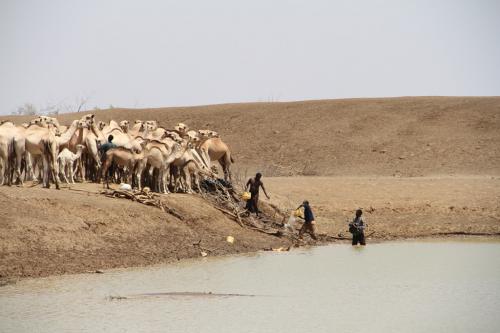UN urges 'reboot' of drought responses to focus more on preparedness
Investing in preparedness and building the resilience of farmers is fundamental to cope with extreme drought, because responding to such situations when they hit might be too late, the head of the United Nations agricultural agency said on JUn 19.

Herders collect water with camels at one of the few remaining water points in drought-affected Bandarero village, Moyale County, Kenya.
“People die because they are not prepared to face the impacts of the drought – because their livelihoods are not resilient enough,” Food and Agriculture Organization (FAO) Director-General José Graziano da Silva told an international seminar in Rome, Italy, recalling that more than 250,000 people perished from hunger in the 2011 drought in Somalia.
“Saving livelihoods means saving lives – this is what building resilience is all about,” he added, noting that for years, the focus has been responding to droughts when they happen, rushing to provide emergency assistance and to keep people alive.
While these emergency responses are important, investing in preparedness and resilience puts countries on a footing to act quickly before it is too late, meaning that farmers and rural communities are better positioned to cope with extreme weather when it does hit.
The need for a global drought re-boot is pressing. The many impacts of drought drive not only hunger and instability but cause economic losses up to $8 billion each annually.
As the planet's climate changes, severe dry-spells are becoming more and more frequent. Since the 1970s, the land area in the world affected by situations of drought has doubled.
The burden is especially high in developing countries, where agriculture remains an economic mainstay. Over 80 percent of damage and losses caused by drought are born by agriculture in the developing world, FAO studies have shown.
And Africa in particular has borne the brunt. Between 2005 and 2016, 84 droughts affected 34 different African nations.
At the event, FAO and the World Meteorological Organization (WMO) signed a memorandum of understanding to deepen their cooperation. They will cooperate in improving agro-meteorological data, tools and methods as well as enhancing access by small farmers to products and services to help them anticipate and proactively prepare for droughts.
“WMO provides guidance and scientific information to strengthen national services responsible for addressing drought risks to agriculture,” said WMO Secretary General Petteri Taalas. “We encourage countries to take early action against drought and to move towards a more proactive approach.”
International Fund for Agriculture Development (IFAD) President Gilbert F. Houngbo in his remarks emphasized the need break the cycle of crisis, disaster and relief, calling on the international community to be proactive and to think not just of today's emergencies, but also of how to prevent tomorrow's.
“This means investing in smallholder farmers to help them address productivity challenges, give them access to markets and finance and most importantly encourage climate-smart agriculture so that when the drought inevitably comes, they have the tools they need to survive and thrive,” said Mr. Houngbo.
Source:United Nations
- 233 reads
Human Rights
Ringing FOWPAL’s Peace Bell for the World:Nobel Peace Prize Laureates’ Visions and Actions

Protecting the World’s Cultural Diversity for a Sustainable Future

The Peace Bell Resonates at the 27th Eurasian Economic Summit

Declaration of World Day of the Power of Hope Endorsed by People in 158 Nations

Puppet Show I International Friendship Day 2020

